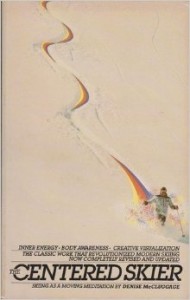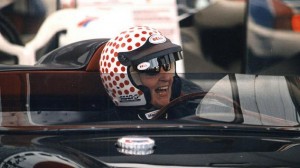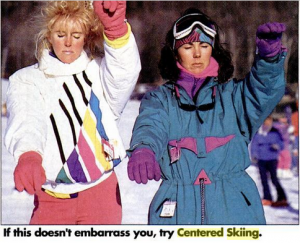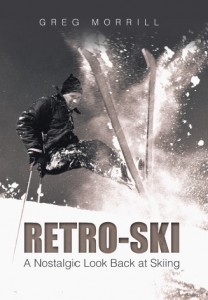We’ve all been there: standing at the top of some precipitous pitch when that feeling of doubt or maybe even fear creeps over us. It could be the top pitch of Starr or Great Scott at Snowbird or Corbet’s Couloir at Jackson Hole. We can feel our bodies tensing up and we know that we need to relax to pull off the run. But telling yourself to relax usually has the exact opposite result! So what if you told yourself “Don’t Relax!”? That’s one of the first examples used in “The Centered Skier” to introduce the psychological side of skiing.
 To paraphrase Yogi Berra, skiing “is 90% mental and the other half is physical.” Historically most books on skiing dealt with technique, but few dealt with the mental aspect of skiing. Then along came “The Centered Skier” by Denise McCluggage.
To paraphrase Yogi Berra, skiing “is 90% mental and the other half is physical.” Historically most books on skiing dealt with technique, but few dealt with the mental aspect of skiing. Then along came “The Centered Skier” by Denise McCluggage.
The first correct answer came from an old skiing buddy of mine, Pat Ostrowski, whom I hadn’t heard from in years! He now lives in Florida, but had been a ski instructor at Smugglers. He had a copy of “The Centered Skier” from his ski instructor days. By the way, I think the book is still on the PSIA’s recommended reading list.
Bill Kornrumpf also identified Denise McCluggage and mentioned her auto racing background.
 Denise McCluggage is primarily recognized as a pioneering woman’s sports car racer and automotive journalist. Denise started racing sports cars in the 1950s when women race-car drivers were barely tolerated. But Denise’s talent, persistence, and intelligence gained her acceptance. Her trademark polka dot racing helmet was seen at races around the world. She won the grand touring category at Sebring in 1961 driving a Ferrari. She won her class at the Monte Carlo Rally in 1964 in a Ford Falcon. She was close friends with such established Formula I drivers as Stirling Moss and Phil Hill. She was inducted into the Automotive Hall of Fame in 2001 and the Sports Car Club of America Hall of Fame in 2006.
Denise McCluggage is primarily recognized as a pioneering woman’s sports car racer and automotive journalist. Denise started racing sports cars in the 1950s when women race-car drivers were barely tolerated. But Denise’s talent, persistence, and intelligence gained her acceptance. Her trademark polka dot racing helmet was seen at races around the world. She won the grand touring category at Sebring in 1961 driving a Ferrari. She won her class at the Monte Carlo Rally in 1964 in a Ford Falcon. She was close friends with such established Formula I drivers as Stirling Moss and Phil Hill. She was inducted into the Automotive Hall of Fame in 2001 and the Sports Car Club of America Hall of Fame in 2006.
Denise was a sports journalist who came east from California to work at the New York Herald Tribune in the mid-1950s. Her weekly column “Drive, She Said” would be syndicated to some 90 newspapers in North America. She would go on to be the founding editor of what is now AutoWeek magazine. She would remain a contributor to that magazine right up until her death last year in May at the age of 88. For her work in automotive journalism she would receive the Dean Batchelor Lifetime Achievement Award.
Denise McCluggage learned to ski while at Mills College in California. When she came to the Herald Tribune in New York she continued skiing in the east eventually buying a place in Warren, Vermont. Denise also played a part in the beginning of Hunter Mountain ski area. She wrote a column about a group in upstate New York that would give away a mountain to anyone who would develop a ski area on it. That generated interest from some Broadway show people including James Hammerstein, son of Oscar Hammerstein II. With their financial backing, Hunter Mountain Ski Bowl would open in January of 1960.
 In the 1970s Denise became interested in Zen and Taoism and saw an application for some of their concepts to skiing. Jack Murphy, general manager of Sugarbush, approached Denise about developing some workshops with their ski school. Denise met with the head of the ski school, Sigi Grottendorfer, and they worked out a format for ski weeks with morning sessions led by Denise and more traditional afternoon lessons with a ski instructor. These were called “centered skiing workshops” and became a popular draw for Sugarbush even after Denise moved to New Mexico.
In the 1970s Denise became interested in Zen and Taoism and saw an application for some of their concepts to skiing. Jack Murphy, general manager of Sugarbush, approached Denise about developing some workshops with their ski school. Denise met with the head of the ski school, Sigi Grottendorfer, and they worked out a format for ski weeks with morning sessions led by Denise and more traditional afternoon lessons with a ski instructor. These were called “centered skiing workshops” and became a popular draw for Sugarbush even after Denise moved to New Mexico.
“The Centered Skier” documents many of the concepts included in the Sugarbush workshops. I must plead guilty and say that I have not read the book. A quick scan shows topics like visualization, breathing, and dealing with fear. I have read some of her columns from SKIING magazine which emphasize that an expert skier is in harmony with the mountain. You do not fight the mountain, but use what it gives you. The book is technically out-of-print, but used copies on Amazon are going for $42.

February 23, 2019 at 1:39 am
This book “The Centered Skier” can be purchased at THE TEMPEST BOOK SHOP / WAITSFIELD, VT for $16.95 = suggest you send them a check, as they are a one man shop and very busy.